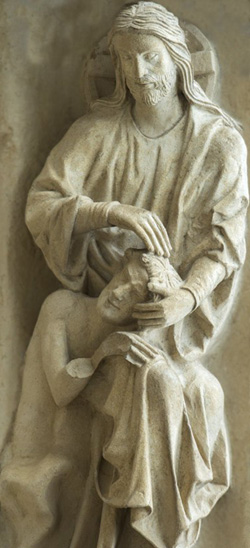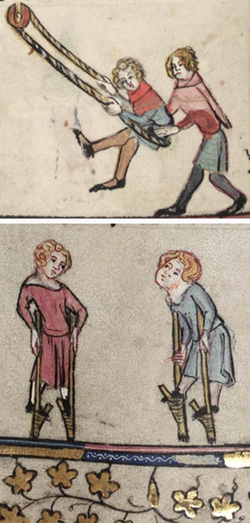Catholic Virtues
 |
 |
 |
 |
 |
 |
 |
True & False Paths to Happiness - IV
The Concept of First Innocence
Innocence is a concept that is not merely negative. It is generally said that a clear conscience brings happiness, and that is true. But one must go further, and describe the first innocence of a soul.
Nocens is a Latin adjective that means harmful. Innocens, therefore, is the opposite, it means non-offensive, non-harmful. A harmful thing is something that does evil. This leads us to ask: Would innocence be nothing more than to be inoffensive, just as colorless means not having color? It is clear that the etymological meaning is this. But there is a fuller innocence, which goes beyond the merely non-harmful, goes beyond not doing evil.
So, what is innocence? Is it a childhood privilege? A state forbidden to adults? Is it simply not to sin because of lack of age or conditions? A merely negative state, which consists only of not doing something?
Innocence: The harmony of all the faculties of the soul
The child is ignorant of the laws of the transmission of life, which is why in current language the child is said to be innocent. When an adult is accused of a crime he did not commit, he is considered innocent. These are correct uses of the term.
However, one can understand the expression first innocence in a specific meaning that goes beyond the usual meaning and applies to all ages.
 The man of any age is innocent when he adheres to that first state of spirit of equilibrium and temperance with which he was created; for this reason he remains open to every form of righteousness and the marvelous.
The man of any age is innocent when he adheres to that first state of spirit of equilibrium and temperance with which he was created; for this reason he remains open to every form of righteousness and the marvelous.
Innocence is an internal harmony of all the faculties of the soul. Because of this harmony, man has an easy and immediate notion of things as they should be and, therefore, of the ideal model of all things.
This concept of innocence, therefore, goes far beyond the current usage of the word. It not only deals with not doing evil but, above all, with adhering strongly to the harmony of what is True, Good and Beautiful. The innocent man is one who did not sin against his first state of spirit of equilibrium and harmony and, for this reason, remains open to all forms of the marvelous and has an appetite for them.
The position of soul of the innocent man is like that of someone who, so to speak, has just left the hands of God. That innocence is almost the innocence of the hand of God. It is a state of content in the relationship of the soul with God, which would need special studies in the philosophical terrain and afterwards in the theological field.
Since the tendency exists to consider first innocence as something that principally concerns childhood, it will be useful to analyze the expression in the different phases of a man’s life. This first knowledge of things has astonishing rational depths, as well as surprising non-rational perceptions. It is not well-understood how these characteristics coexist. But in fact they work together perfectly.
Innocence & the different stages of life
The march of innocence in life has several stages. First, there is a toy phase; afterwards the child awaken to the charms (and risks) of sociability. Later, adulthood is reached and, finally, the sunset of life and death. This being the case, we can adopt a mnemonic designation: ‘my toys; my friends; my career, and beyond.’
First stage: The child, up to a certain age, pays much more attention to the objects surrounding him than to the persons around him.
 Second stage: At a certain moment, others appear on the horizon, his psychology, his soul. “Others” in this case are the boys or girls with whom he plays, and not his father or mother.
Second stage: At a certain moment, others appear on the horizon, his psychology, his soul. “Others” in this case are the boys or girls with whom he plays, and not his father or mother.
The child is born with the need to know other persons, to establish comparisons and differences between him and them.
At a certain moment, the companions speaks much more to him than the toy. The toy is replaced by the other boy or boys and becomes much more than the thing they play with. The instinct of sociability opens.
Third stage: In this phase, what dominates the individual is the idea of doing something on this Earth. The person starts to think about his biography, what he wants, what will happen to him, what he will be. It is a new horizon that gives him an architectonic idea of himself and of the time that runs ahead of him, but where he tends to dissociate himself from those first birds and butterflies.
On the other hand, innocence can also culminate in something. It would be like the arrow of the Church of Notre Dame, pointing upwards.
Fourth stage: All existence is a model that God is making, which each one can resist or accept, so that he becomes like unto Him. In the final moment, God grants the person a last chance to be like unto Him.
If he accepts, he goes to Heaven and is welcomed for all eternity. If he refuses, he is rejected by God forever.
The whole biography of a person is the modeling based on this first image received in childhood and developed through his existence until reaching the final image. Between that first image and the last, the life of each person passes.
Having presented this overall vision, we will go on to consider the ventures and adventures of innocence in each of the stages listed above.
Continued

Nocens is a Latin adjective that means harmful. Innocens, therefore, is the opposite, it means non-offensive, non-harmful. A harmful thing is something that does evil. This leads us to ask: Would innocence be nothing more than to be inoffensive, just as colorless means not having color? It is clear that the etymological meaning is this. But there is a fuller innocence, which goes beyond the merely non-harmful, goes beyond not doing evil.
So, what is innocence? Is it a childhood privilege? A state forbidden to adults? Is it simply not to sin because of lack of age or conditions? A merely negative state, which consists only of not doing something?
Innocence: The harmony of all the faculties of the soul
The child is ignorant of the laws of the transmission of life, which is why in current language the child is said to be innocent. When an adult is accused of a crime he did not commit, he is considered innocent. These are correct uses of the term.
However, one can understand the expression first innocence in a specific meaning that goes beyond the usual meaning and applies to all ages.

Adam being molded by God
Innocence is an internal harmony of all the faculties of the soul. Because of this harmony, man has an easy and immediate notion of things as they should be and, therefore, of the ideal model of all things.
This concept of innocence, therefore, goes far beyond the current usage of the word. It not only deals with not doing evil but, above all, with adhering strongly to the harmony of what is True, Good and Beautiful. The innocent man is one who did not sin against his first state of spirit of equilibrium and harmony and, for this reason, remains open to all forms of the marvelous and has an appetite for them.
The position of soul of the innocent man is like that of someone who, so to speak, has just left the hands of God. That innocence is almost the innocence of the hand of God. It is a state of content in the relationship of the soul with God, which would need special studies in the philosophical terrain and afterwards in the theological field.
Since the tendency exists to consider first innocence as something that principally concerns childhood, it will be useful to analyze the expression in the different phases of a man’s life. This first knowledge of things has astonishing rational depths, as well as surprising non-rational perceptions. It is not well-understood how these characteristics coexist. But in fact they work together perfectly.
Innocence & the different stages of life
The march of innocence in life has several stages. First, there is a toy phase; afterwards the child awaken to the charms (and risks) of sociability. Later, adulthood is reached and, finally, the sunset of life and death. This being the case, we can adopt a mnemonic designation: ‘my toys; my friends; my career, and beyond.’
First stage: The child, up to a certain age, pays much more attention to the objects surrounding him than to the persons around him.

Medieval children playing
The child is born with the need to know other persons, to establish comparisons and differences between him and them.
At a certain moment, the companions speaks much more to him than the toy. The toy is replaced by the other boy or boys and becomes much more than the thing they play with. The instinct of sociability opens.
Third stage: In this phase, what dominates the individual is the idea of doing something on this Earth. The person starts to think about his biography, what he wants, what will happen to him, what he will be. It is a new horizon that gives him an architectonic idea of himself and of the time that runs ahead of him, but where he tends to dissociate himself from those first birds and butterflies.
On the other hand, innocence can also culminate in something. It would be like the arrow of the Church of Notre Dame, pointing upwards.
Fourth stage: All existence is a model that God is making, which each one can resist or accept, so that he becomes like unto Him. In the final moment, God grants the person a last chance to be like unto Him.
If he accepts, he goes to Heaven and is welcomed for all eternity. If he refuses, he is rejected by God forever.
The whole biography of a person is the modeling based on this first image received in childhood and developed through his existence until reaching the final image. Between that first image and the last, the life of each person passes.
Having presented this overall vision, we will go on to consider the ventures and adventures of innocence in each of the stages listed above.
Continued

Posted February 14, 2020





